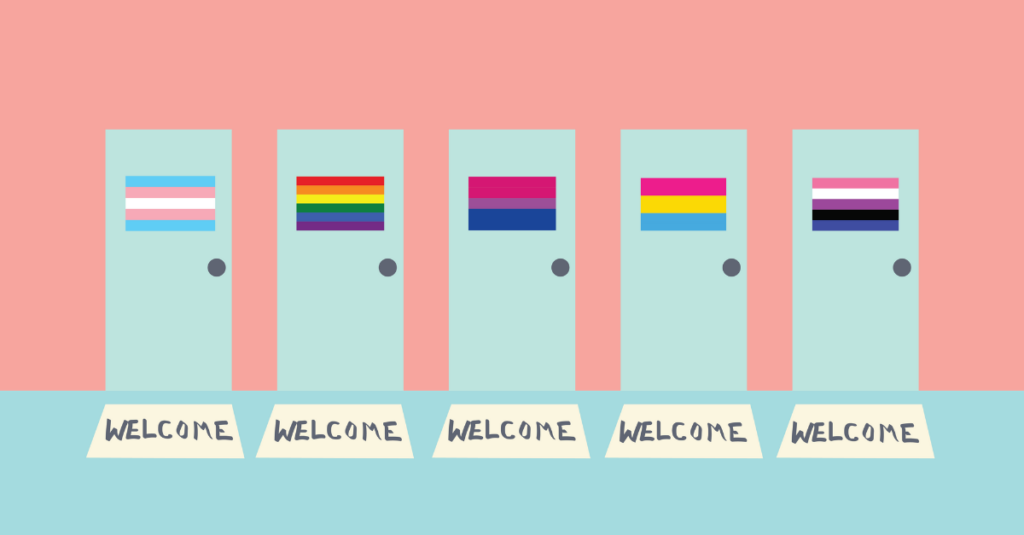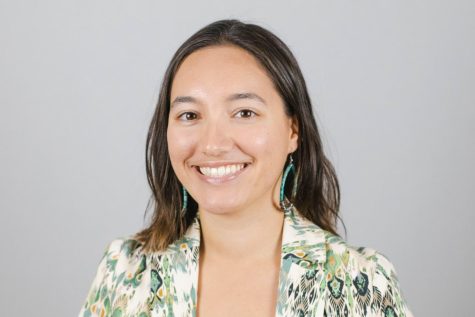Alyssa Bjork, a junior majoring in secondary education and a RA for Hunt Hall first thought of creating a gender-inclusive house on campus while talking to one of her residents.
“I thought about it because one of my residents had brought up gender blind housing to me and I was like that would be really cool. Why don’t we have that in a dorm here?” Bjork said. “I brought it up to my boss and he was like, well we’ve actually talked about it before.”
The creation of an LGBTQ+ priority house had been an idea on campus for a while but it never made it out of the planning stages and into reality.
Then Bjork and Haylee Snyder, a junior double majoring in outdoor recreation and psychology and a RA for Maple East, decided to team up last year and start sketching out the steps they would need to take in order to create more gender-inclusive housing on campus.
Even though the LGBTQ+ priority dorms don’t exist at the moment at NMU, that doesn’t mean the college doesn’t have options available for students who identify with the LGBTQ+ community and live in the dorms.
“Housing already does have a lot of accommodations for LGBT students but we just think this could be an addition that would make a lot of students more comfortable and just enhance the living experience and accommodations that they already have,” Snyder said.
One of the accommodations NMU Housing currently offers is the option for trans students to room with whichever gender they feel most comfortable living with. However, there is still that fear of having unaccepting or transphobic roommates and the LGBTQ+ priority dorms would be a way to alleviate some of that fear.
“A big part of it is going to be gender blind room assignment so like anyone can live with anyone and that’s a big part for our trans and nonbinary residents so there’s not that fear going in,” Bjork said. “I think that’s the most noticeable thing is that there aren’t girls’ suites or boys’ suites and things like that, it’s just going to kind of be like a mish-mash. I think it’s also going to be very included because people who move into that house are going to be like, yes this is a community where I can be loud and myself. I think we’re going to see a lot more inclusion and more open doors and a lot more people working and really advocating for the LGBTQ+ community on campus.”
Even though the halls would be advertised towards students in the LGBTQ+ community, allies and other people who wanted to live in these dorms would be welcome. Their goal is to have two houses, one in the Woods and one in Quad II, which would total around 100 people who could live in these dorms.
“I want to emphasize that it’s a priority house for LGBT students. It’s not exclusionary,” Snyder said. “People who are straight or cisgender could still live here too. It’s not just for LGBTQ+ students. They would get first priority in the rooms on those floors and then anybody else who would also like to live there would be welcome too.”
Bjork and Snyder gauged student interest for the idea in August. They created an online survey and collected information from any student who stopped by their booth at Fall Fest.
“We had a QR code to a survey that people could take and that was just questions like ‘do you identify as part of this community?’ ‘Would you be interested in living in a house like this?’ and just getting feedback and peoples’ concerns,” Bjork said. “Our feedback was overwhelmingly positive. We had 53 responses and I don’t think there was any that said no.”
Bjork and Snyder are planning on gathering more responses later this month by hanging posters throughout the residence halls with the QR code to the survey as well as information about joining a student panel. They are hoping this student panel will provide a wider range of feedback and insight into potential problems the group might encounter.
“The big thing that we’re looking for help with right now is just getting like what are the holes that could be in this? Like the devil’s advocate side of things because it is such a small group of us and we’ve all thought about the bad things that could happen with it,” Bjork said. “Just hearing back from as many people saying ‘have you thought about this, have you thought about that?’ That’s been the most helpful thing so we can make sure that we’re completely seeing the huge picture.”
A bigger part of identifying potential issues is discussing ways to alleviate them.
“One concern that’s been brought up multiple times and by many different people … was how are you going to stop targeting that community? How would you make it so people don’t see this entire floor and say ‘oh I can just be awful’?” Snyder said.
“I think we’ve come to the conclusion that it would be a safer spot and you’d have community rally behind you basically. So if anybody does get targeted, if anybody is a victim of homophobia or transphobia, you have 100 people backing you rather than just a couple scattered across the university. So it’s more consolidated, more condensed and we think it would actually have the opposite effect as in less targeting because you know that you have like 50 people on one floor who are all going to support you to the end,” said Snyder.
Not only are Bjork and Snyder getting input from other students but they’re gathering information from other universities and research journals. Some of their inspirations have been University of Wisconsin Eau Claire and University of Michigan.
“One thing we’re doing very extensively is a lot of research,” Snyder said. “We’re reaching out to other universities that also have houses like this. There’s top universities across the country and in Michigan that all have gender-inclusive housing and LBGT floors. We’ve been looking at those and reaching out to them and also doing research about how having a community and meaning and purpose can really benefit the mental health of LGBTQ+ students.”
This research includes studies like “Depression and Attempted Suicide among LGBTQ College Students” in the Journal of College Student Development that found environments and microaggressions towards LGBTQ+ students, whether intentional or not, add to “feelings of distress and strain, which could contribute to increased risk for depression.”
LGBTQ+ students are also six times as likely to experience depression when compared to heterosexual or cisgender students, according to the Anxiety and Depression Association of America.
This increased risk for depression and anxiety in members of the LGBTQ+ community is shown to mainly stem from microaggressions and discrimination. However, according to a study published by the American Psychological Association that focused on bisexual women and the impact of community, “LGBTQ community connectedness moderated the link between antibisexual discrimination and psychological distress.” In other words, being around people that have gone through similar experiences or simply living in a more supportive environment can help.
All this research from a wide variety of sources is being compiled and will be used to back the proposal of implementing LGBTQ+ priority dorms on campus that Bjork and Synder are planning on presenting to NMU.
“Right now we’re working on getting all of our bases covered so that the higher-ups have to do the least amount of work as possible,” Bjork said. “We’re going to be able to propose it at that level where it just has to be implemented. So right now we’re waiting to finish our research and finish talking to other colleges and finish doing like the paperwork side of it and then we’re going to be proposing it to housing and then to the school.”
They are hoping to complete most of the work and gather student opinions in September so the proposal can be ready by early October.
“We have a deadline for when the proposal should be finished which is Oct. 11, which is National Coming Out Day, we kind of picked a memorable day there,” Snyder said. “That’s kind of the deadline for us but we haven’t talked to anybody at housing yet or anybody from the school so we’re just waiting to see when they’re available after that date to talk to them about it.”
Bjork and Snyder know implementing a project like this requires a lot of work and they’re prepared to do most of the heavy lifting. However, even with all their planning and research, they know the success of their proposal is not guaranteed.
“A big thing we talked about is making sure students know that if this gets rejected, it’s not necessarily because Northern is homophobic,” Bjork said. “More than likely, if this doesn’t happen this year, it’s because there’s something that higher up needs to be fixed within the university, not so much that they have an issue with an LGBTQ house but more so the inner workings behind it in terms of paperwork and legality issues and that sort of thing.”
But for Bjork and Synder, this project is less about the paperwork and more about helping students on campus feel safe and comfortable where they live. They hope creating a more condensed and open community of LGBTQ+ students will provide an accepting environment that may even attract new students to the U.P. who identify as a part of the LGBTQ+ community.
“I grew up in the U.P. and a big part of the reason I wanted to go to college further away was to make sure I was putting myself in the most accepting environment possible so I think knowing that there’s that environment here I think would be really helpful,” Bjork said. “I identified as bi and at Grand Valley, I didn’t come out to my roommate at all … and now identifying as a lesbian woman, I don’t want anyone, whether they’re bi, trans, nonbinary or anything to feel like they have to mitigate their identity to feel safe in their room.”


























